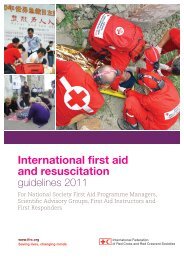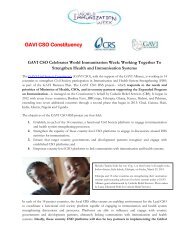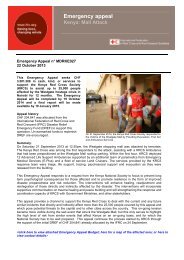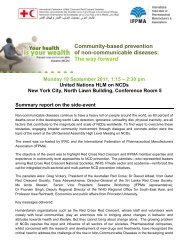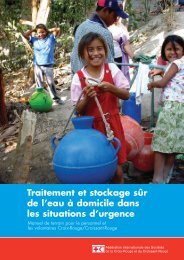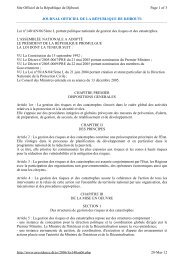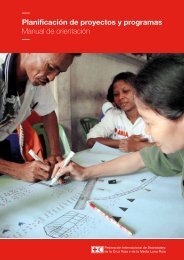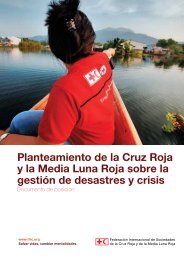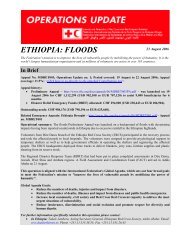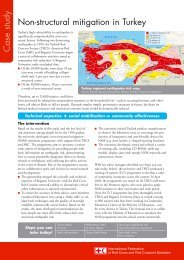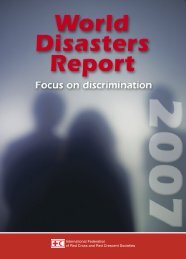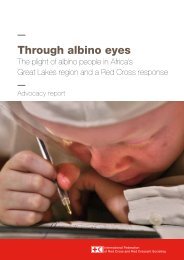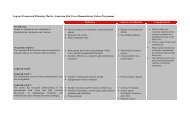World Disasters Report 2010 - International Federation of Red Cross ...
World Disasters Report 2010 - International Federation of Red Cross ...
World Disasters Report 2010 - International Federation of Red Cross ...
Create successful ePaper yourself
Turn your PDF publications into a flip-book with our unique Google optimized e-Paper software.
The <strong>Red</strong> <strong>Cross</strong> has 90 first-aid stations<br />
throughout the city and all its ambulances are<br />
equipped with GPS and closed circuit television.<br />
The command centre at headquarters always<br />
knows where its ambulances are and they<br />
can be diverted at a moment’s notice to the<br />
scene <strong>of</strong> a major accident. Doctors can assist<br />
remotely with the early treatment <strong>of</strong> seriously injured<br />
patients and ensure patients are brought<br />
to the appropriate hospital department.<br />
In 2009, in pursuit <strong>of</strong> their goal <strong>of</strong> saving<br />
both time and lives, they augmented their vehicle<br />
fleet with 50 motor bikes for first aiders who<br />
are equipped with Personal Digital Assistants<br />
(or palmtops) and GPS. “Motorcycles can<br />
reach the patients very fast when there are<br />
traffic jams. So we can make good use <strong>of</strong> the<br />
first four to six minutes after the call comes in,<br />
for this is the most precious period <strong>of</strong> time especially<br />
if the ambulance is going to be delayed<br />
by traffic,” said Han.<br />
In addition, she explained: “999 has a<br />
special programme for more than 200,000<br />
households in Beijing. If they press a certain<br />
button on their phone panel, 999 will be<br />
aware <strong>of</strong> the basic medical background <strong>of</strong> the<br />
family, medical records, address and phone<br />
number. These are usually families looking after<br />
an elderly person.”<br />
The Chinese <strong>Red</strong> <strong>Cross</strong> has developed a<br />
unique mobile phone platform with many features<br />
not found on standard models. The GPSequipped<br />
phones have proved useful to many<br />
families caring for a senile senior citizen lost<br />
in the city. The phones have an alarm button<br />
which will alert the <strong>Red</strong> <strong>Cross</strong> emergency<br />
centre when activated without even making a<br />
phone call. The phones can vocalize text messages<br />
for those who have poor sight and act<br />
as a torch and they also have an in-built radio.<br />
A third generation <strong>of</strong> this mobile phone,<br />
which costs less than US$ 100, is now under<br />
development. It can dial 999 when activated<br />
by an immobilized patient wearing a watchlike<br />
device on the wrist.<br />
The Beijing <strong>Red</strong> <strong>Cross</strong> provides many other<br />
services including helping victims <strong>of</strong> traffic accidents<br />
compile insurance claims through the 999<br />
forensic centre’s reports and providing medical<br />
care to anyone being held in police custody.<br />
“Hi-tech equipment is only one aspect <strong>of</strong><br />
our work. In addition to the technology we<br />
have also been focusing on increasing people’s<br />
knowledge, skills and general awareness<br />
about disaster risk reduction. The Beijing<br />
<strong>Red</strong> <strong>Cross</strong> issued 6 million copies <strong>of</strong> its family<br />
first-aid manual in Beijing last year. More than<br />
3 million people had received basic first-aid<br />
training by the end <strong>of</strong> 2009. We will continue<br />
to enhance our smart power – strategic planning<br />
and management in order to build a safer<br />
and securer mega-city,” concluded Han.<br />
Visitors to one <strong>of</strong> the city’s most popular<br />
tourist attractions, Tiananmen Square, will be<br />
happy to hear that there is a first-aid post and<br />
ambulance stationed there 24/7. You are also<br />
in a city where more than 3 million people<br />
have received basic first-aid training – so help<br />
may never be too far away. �<br />
Mean streets<br />
Violence is a serious risk to health in many large cities (see Chapter 4), whether it is<br />
Rio de Janeiro, Los Angeles or the banlieues <strong>of</strong> Paris. Much <strong>of</strong> this violence is related<br />
to the illicit drugs business which largely depends on end users living in cities. But<br />
there are other urban factors such as social exclusion, xenophobia and marginalization,<br />
unemployment and alcohol abuse that also fuel violence.<br />
<strong>World</strong> <strong>Disasters</strong> <strong>Report</strong> <strong>2010</strong> – Focus on urban risk<br />
107



